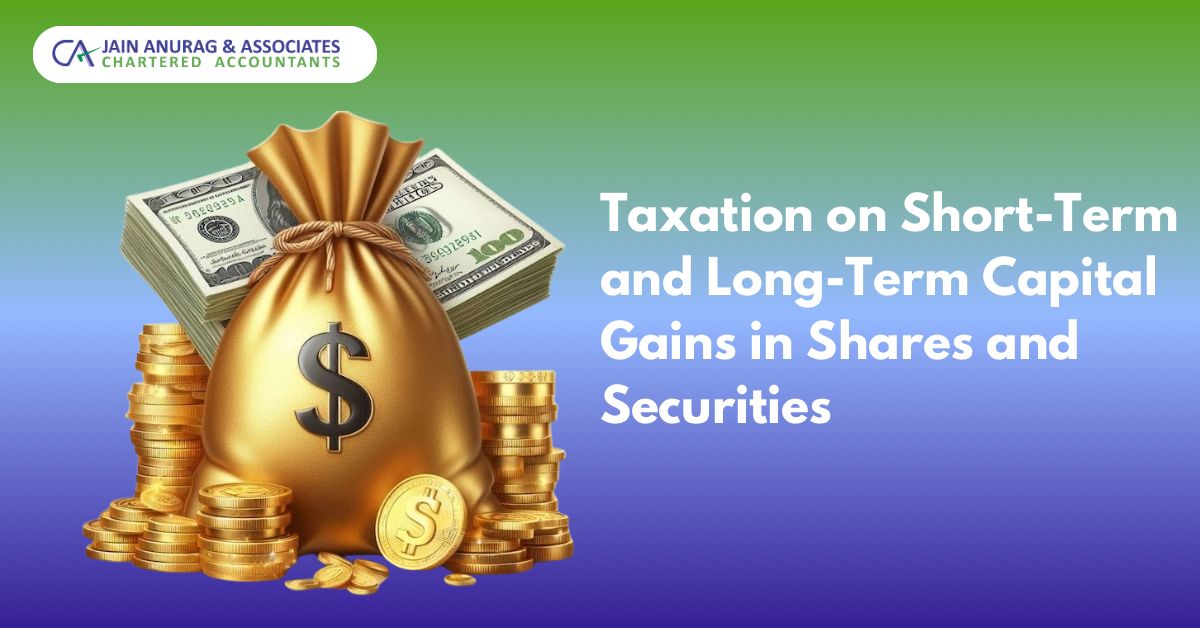Dec 14, 2024, Posted by Admin
Short Term vs Long Term Capital Gains - Key Differences

Investing in shares and securities can be a lucrative way to build wealth, but it’s essential to understand the tax implications associated with your gains. The taxation on capital gains—profits earned from selling shares or securities—is categorized into two types: short-term capital gains (STCG) and long-term capital gains (LTCG). The classification depends on the holding period of the asset, and each category is taxed differently.
What Are Short-Term and Long-Term Capital Gains?
1. Short-Term Capital Gains (STCG):
If you sell equity shares or equity-oriented mutual funds listed on a recognized stock exchange within 12 months of purchase, the profits qualify as short-term capital gains.
Profits from debt mutual funds, debt ETFs, market-linked debentures, unlisted bonds, and debentures after purchase on 23/07/2024 will not be classified as short-term capital gains, irrespective of their holding periods (As amended in Budget 2024). That means the income from that instrument will be added to the total income, and tax will be payable as per the tax slab of the assessee.
2. Long-Term Capital Gains (LTCG):
Equity shares or equity-oriented mutual funds held for more than 12 months are classified as long-term capital assets and the gains from their sale are termed long-term capital gains.
All other asset classes will be classified as long-term if held for more than 24 months or two years. These rules are applicable from July 23, 2022.
Tax Rates on Short-Term and Long-Term Capital Gains
1.Tax on Short-Term Capital Gains (STCG):
STCG on equity shares and equity-oriented mutual funds is taxed at a flat rate of 20%, provided the transaction is subject to Securities Transaction Tax (STT).
For other securities, such as debt mutual funds, bonds, or debentures, STCG is added to the taxpayer’s total income and taxed according to the applicable income tax slab rate.
2. Tax on Long-Term Capital Gains (LTCG):
LTCG on equity shares and equity-oriented mutual funds exceeding ₹1 lakh per financial year is taxed at 12.50%, without the benefit of indexation. Gains up to ₹1 lakh are exempt.
For other securities like unlisted shares, LTCG is taxed at 20% with the benefit of indexation, which adjusts the cost of acquisition for inflation.
Deductions and Exemptions
1. Section 54F and Section 54EC:
Under Section 54F, if you reinvest the proceeds from the sale of long-term capital assets (other than residential property) into a new residential property, you can claim an exemption on LTCG.
Investments in specified bonds under Section 54EC, such as those issued by the National Highways Authority of India (NHAI) or Rural Electrification Corporation (REC), allow you to claim exemption on LTCG, up to a maximum limit of ₹50 lakhs.
2. Tax-Loss Harvesting:
Investors can offset short-term capital losses against short-term capital gains as well as long-term capital gains.
Long-term capital losses against long-term capital gains to reduce their taxable income.
Unutilized losses can be carried forward for up to 8 years to offset future gains.
Tax Implications for Non-Resident Indians (NRIs)**
NRIs are also subject to capital gains tax on shares and securities in India. However, the tax rates and exemptions may differ based on the Double Taxation Avoidance Agreement (DTAA) between India and their country of residence.
Key Points to Keep in Mind
1. Maintain accurate records of purchase and sale transactions, including brokerage and STT paid.
2. Use tax-saving strategies like reinvestment and tax-loss harvesting to optimize your tax liability.
3. Consult with a tax professional to ensure compliance with the Income Tax Act and to make the most of available deductions and exemptions.
Understanding the taxation on short-term and long-term capital gains is crucial for every investor. With careful planning and informed decision-making, you can maximize your post-tax returns and stay financially secure.
At Jain Anurag & Associates, Chartered Accountants, a professionally managed CA firm based in Mumbai, we specialize in providing consultancy and advisory services to plan Tax for Long Term and Short-Term Capital Gain for future goals. If you're looking for reliable and strategic Tax and financial advisory services, feel free to reach out to us.